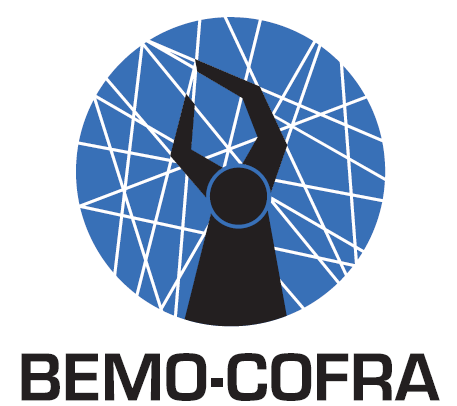Navigation
 Project Overview
Project Overview Work Plan
Work Plan Partners
Partners Deliverables
Deliverables Scientific publications
Scientific publications Downloads
Downloads Press coverage
Press coverage All News
All News Web Links
Web Links Photo Gallery
Photo Gallery Search
SearchPortuguês
 Resumo
Resumo Parceiros
ParceirosUsers Online Now
About us

Read the BEMO-COFRA newsletters here:
#1 October 2012
#2 February 2013
#3 October 2013
#4 February 2014

Registered Members Only
Share this
Facebook

The BEMO-COFRA project is a 30-months EU-Brazil cooperative research project started in 2011.
The project is partly funded by the European Commission under the 7th Framework Programme in the area of EU-Brazil Research and Development cooperation under Grant Agreement no. 288133
The Brazilian funding is provided by CNPq Conselho Nacional de Desenvolvimento Científico e Tecnológico


 Impressum
Impressum  Privacy
Privacy
Newsletters
The project is partly funded by the European Commission under the 7th Framework Programme in the area of EU-Brazil Research and Development cooperation under Grant Agreement no. 288133
The Brazilian funding is provided by CNPq Conselho Nacional de Desenvolvimento Científico e Tecnológico

Read the BEMO-COFRA newsletters here:
#1 October 2012
#2 February 2013
#3 October 2013
#4 February 2014
Newsletter Subscription
Registered Members Only
The BEMO-COFRA Validation Activities
Validation is part of the implementation of a user-centred development process. The main aim is to assure that the BEMO-COFRA services developed adhere to the necessary quality standards for professional services and meet the needs and requirements of the end users.
The validation activities in BEMO-COFRA follow the evolutionary requirement engineering methodology managed from WP2. There are two iterations in the project and validation will be carried out at the end of each iteration. Thus, the validation results of the first iteration will feed into the development work that will be carried out in the next iteration. This approach will drive the project towards a better match with the actual user requirements in the subsequent iteration cycle. A final field trial and full validation of the BEMO-COFRA platform will be carried out at the end of the project.
Validation is part of the implementation of a user-centred development process and the BEMO-COFRA project is therefore committed to test and validate the real added value of the services and systems to the stakeholders’ satisfaction. The validation is made through the comparison between an expected impact (requirement) and how the real application works. The user requirements consist of a list of features and properties of the BEMO-COFRA platform including quality criteria, which are considered relevant by the users.
Requirements are divided into functional and non-functional requirements. Functional requirements specify the product's functionality, derived from the fundamental purpose of the product, whereas non-functional requirements are the properties of the product, the qualities and characteristics that make the product attractive, usable, fast or reliable. While the fit criteria for each specific requirement are of course a tangible means of validation of each requirement, the focus of the BEMO-COFRA validation plan is at a higher level, namely the testing and validation of the different components and of the final BEMO-COFRA platform.
The final overall validation of the BEMO-COFRA platform will be carried out by deploying the BEMO-COFRA platform in a test bed provided by COMAU, Brazil.
The validation activities in BEMO-COFRA follow the evolutionary requirement engineering methodology managed from WP2. There are two iterations in the project and validation will be carried out at the end of each iteration. Thus, the validation results of the first iteration will feed into the development work that will be carried out in the next iteration. This approach will drive the project towards a better match with the actual user requirements in the subsequent iteration cycle. A final field trial and full validation of the BEMO-COFRA platform will be carried out at the end of the project.
Validation is part of the implementation of a user-centred development process and the BEMO-COFRA project is therefore committed to test and validate the real added value of the services and systems to the stakeholders’ satisfaction. The validation is made through the comparison between an expected impact (requirement) and how the real application works. The user requirements consist of a list of features and properties of the BEMO-COFRA platform including quality criteria, which are considered relevant by the users.
Requirements are divided into functional and non-functional requirements. Functional requirements specify the product's functionality, derived from the fundamental purpose of the product, whereas non-functional requirements are the properties of the product, the qualities and characteristics that make the product attractive, usable, fast or reliable. While the fit criteria for each specific requirement are of course a tangible means of validation of each requirement, the focus of the BEMO-COFRA validation plan is at a higher level, namely the testing and validation of the different components and of the final BEMO-COFRA platform.
The final overall validation of the BEMO-COFRA platform will be carried out by deploying the BEMO-COFRA platform in a test bed provided by COMAU, Brazil.


